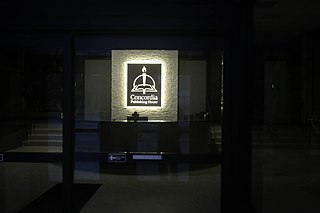Related Research Articles

The Lutheran Church – Missouri Synod (LCMS), also known as the Missouri Synod, is a traditional, confessional Lutheran denomination in the United States. With 1.8 million members, it is the second-largest Lutheran body in the United States, behind the Evangelical Lutheran Church in America. The LCMS was organized in 1847 at a meeting in Chicago, Illinois, as the German Evangelical Lutheran Synod of Missouri, Ohio, and Other States, a name which partially reflected the geographic locations of the founding congregations.
The Evangelical Lutheran Church in America (ELCA) is a mainline Protestant Lutheran church headquartered in Chicago, Illinois. The ELCA was officially formed on January 1, 1988, by the merging of three Lutheran church bodies. As of 2022, it has approximately 2.9 million baptized members in 8,640 congregations.

The Wisconsin Evangelical Lutheran Synod (WELS), also referred to simply as the Wisconsin Synod, is an American Confessional Lutheran denomination of Christianity. Characterized as theologically conservative, it was founded in 1850 in Milwaukee, Wisconsin.

The Concordia Theological Seminary is a Lutheran seminary in Fort Wayne, Indiana. It offers professional, master's degrees, and doctoral degrees affiliated with training clergy and deaconesses for the Lutheran Church–Missouri Synod (LCMS).

Concordia Seminary is a Lutheran seminary in Clayton, Missouri. The institution's primary mission is to train pastors, deaconesses, missionaries, chaplains, and church leaders for the Lutheran Church–Missouri Synod (LCMS). Founded in 1839, the seminary initially resided in Perry County, Missouri. In 1849, it was moved to St. Louis, and in 1926, the current campus was built.

Seminex is the widely used abbreviation for Concordia Seminary in Exile, which existed from 1974 to 1987 after a schism in the Lutheran Church–Missouri Synod (LCMS). The seminary in exile was formed due to the ongoing Fundamentalist–Modernist Controversy that was dividing Protestant churches in the United States. At issue were foundational disagreements on the authority of Scripture and the role of Christianity. During the 1960s, many clergy and members of the LCMS grew concerned about the direction of education at their flagship seminary, Concordia Seminary, in St. Louis, Missouri. Professors at Concordia Seminary had, in the 1950s and 1960s, begun to utilize the historical-critical method to analyze the Bible rather than the traditional historical-grammatical method that considered scripture to be the inerrant Word of God.

Gerald Bryan Kieschnick is the Chief Executive Officer of Legacy Deo. Kieschnick served as the 12th president of The Lutheran Church–Missouri Synod (LCMS), being elected to three terms in 2001, 2004, and 2007. He was defeated in his bid for a fourth term by the Rev. Matthew C. Harrison on July 13, 2010, at the 64th Regular Convention of the LCMS, and his presidency ended on August 31, 2010.

The Evangelical Lutheran Synod (ELS) is a US-based Protestant Christian denomination based in Mankato, Minnesota. It describes itself as a conservative, Confessional Lutheran body. The ELS has 130 congregations and has missions in Peru, Chile, India, South Korea, Ukraine, Czech Republic, and Latvia.

The Evangelical Lutheran Synodical Conference of North America, often known simply as the Synodical Conference, was an association of Lutheran synods that professed a complete adherence to the Lutheran Confessions and doctrinal unity with each other. Founded in 1872, its membership fluctuated as various synods joined and left it. Due to doctrinal disagreements with the Lutheran Church–Missouri Synod (LCMS), the Evangelical Lutheran Synod (ELS) and the Wisconsin Evangelical Lutheran Synod (WELS) left the conference in 1963. It was dissolved in 1967 and the other remaining member, the Synod of Evangelical Lutheran Churches, merged into the LCMS in 1971.

The Lutheran Churches of the Reformation (LCR) is an association of Lutheran congregations. The LCR has its roots among groups of Lutherans that broke with the Lutheran Church–Missouri Synod (LCMS) in the middle of the 20th century, and was formally incorporated in 1964. Church services are generally traditional and reverent in the style of the mid-1900s conservative Christians.

Concordia Publishing House (CPH), founded in 1869, is the official publishing arm of the Lutheran Church–Missouri Synod (LCMS). Headquartered in St Louis, Missouri, at 3558 S. Jefferson Avenue, CPH publishes the synod's official monthly magazine, The Lutheran Witness, and the synod's hymnals, including The Lutheran Hymnal (1941), Lutheran Worship (1982), and Lutheran Service Book (2006). It publishes a wide range of resources for churches, schools, and homes and is the publisher of the world's most widely circulated daily devotional resource, Portals of Prayer. Its children's books, known as Arch Books, have been published in millions of copies. Concordia Publishing House is the oldest publishing company west of the Mississippi River and the world's largest distinctly Lutheran publishing house.
Lutheran Hour Ministries (LHM) is a Christian outreach ministry affiliated with the Lutheran Church–Missouri Synod, Lutheran Church - Canada and Lutheran Women in Mission (LWML). Its mission is "Bringing Christ to the Nations—and the Nations to the Church". LHM's flagship radio program, The Lutheran Hour, is one of the longest-running Christian radio broadcasts, was at one time the most-syndicated, and the speakers have been some of the most-heard preachers of the 20th century. The supporters of The Lutheran Hour helped its founding organization, the Lutheran Laymen's League, become a multimillion-dollar Christian missionary foundation.
Ralph Arthur Bohlmann was the ninth president of the Lutheran Church–Missouri Synod (LCMS), serving four terms from 1981 until 1992. Bohlmann graduated from Concordia Seminary, St. Louis, in 1956 and was ordained on June 29, 1958, in Des Moines, Iowa, by his father, the Rev. Arthur E. Bohlmann. He later received his Ph.D. from Yale University.

Oswald Carl Julius Hoffmann was an American clergyman and broadcaster who was best known as a speaker for The Lutheran Hour, a long-running radio program affiliated with the Lutheran Church–Missouri Synod (LCMS). During his time on the Lutheran Hour, the weekly broadcast was heard on 1,200 stations in the U.S. and in thirty other nations.

Robert David Preus was an American Lutheran pastor, professor, author, and seminary president.
The Georgia Council on Human Relations (GCHR) was a biracial group working against prejudice and discrimination due to race, religion, ethnicity, and nationality. Non-profit, interracial, and non-denominational, at its peak the GCHR operated in ten chapters across the state, including Albany, Atlanta, Augusta, Columbus, LaGrange, Macon, and Savannah. GCHR was the Southern Regional Council's Georgia affiliate.
Lutheranism was first introduced to Angola in the late 1800s, when Finnish missionaries began working in northern Namibia and southern Angola. Following the Portuguese defeat of Mandume Ya Ndemufayo in 1917, the Lutheran church in Angola was repressed by the Roman Catholic Portuguese authorities. In 1956, Lutheranism was reestablished in Angola, and in 1991, the Evangelical Lutheran Church of Angola was organized as an independent church body. In 1997, a smaller group of conservative Lutheran missionaries helped to organize a second Angolan Lutheran church: the Confessional Lutheran Church in Angola.

Concordia College was a Lutheran college and high school in Conover, North Carolina. Founded as a high school by members of the Evangelical Lutheran Tennessee Synod in 1878, it added college courses in 1881. The English Evangelical Lutheran Synod of Missouri and Other States took over control of the school in 1893. Control passed to the Lutheran Church–Missouri Synod when the English Synod merged with it in 1911. In April 1935, a fire destroyed the main building, and the school closed permanently at the end of the spring semester.
The following is a timeline of significant events in the history of the Lutheran Church – Missouri Synod.
References
- 1 2 "Andrew Schultze : Human Dignity, Equality, and Unity under God". Lutheran Church – Missouri Synod . Retrieved December 27, 2023.
- ↑ Kathryn M. Galchutt, The Career of Andrew Schulze: Lutherans and Race in the Civil Rights Era (Macon: Mercer University Press, 2005), 179.
- ↑ Andrew Schulze and the "Post-Racial" Church, Kathryn M. Galchutt, The Cresset, (Vol LXXIV, No. 1, pp. 14-20)
- ↑ Kathryn M. Galchutt, The Career of Andrew Schulze: Lutherans and Race in the Civil Rights Era, (Macon: Mercer University Press, 2005), 181.